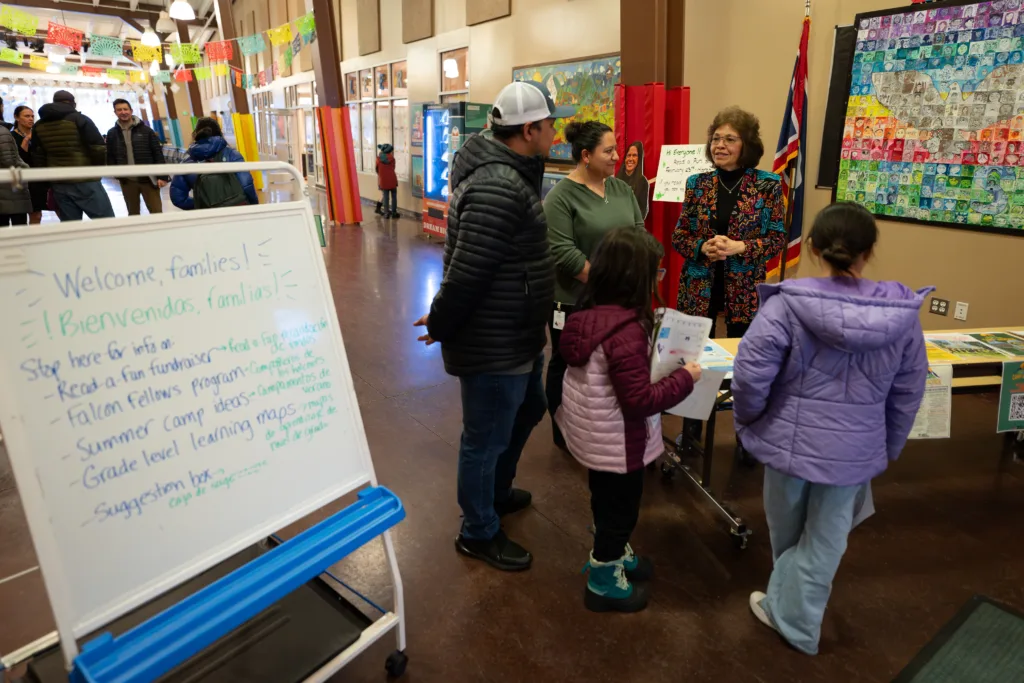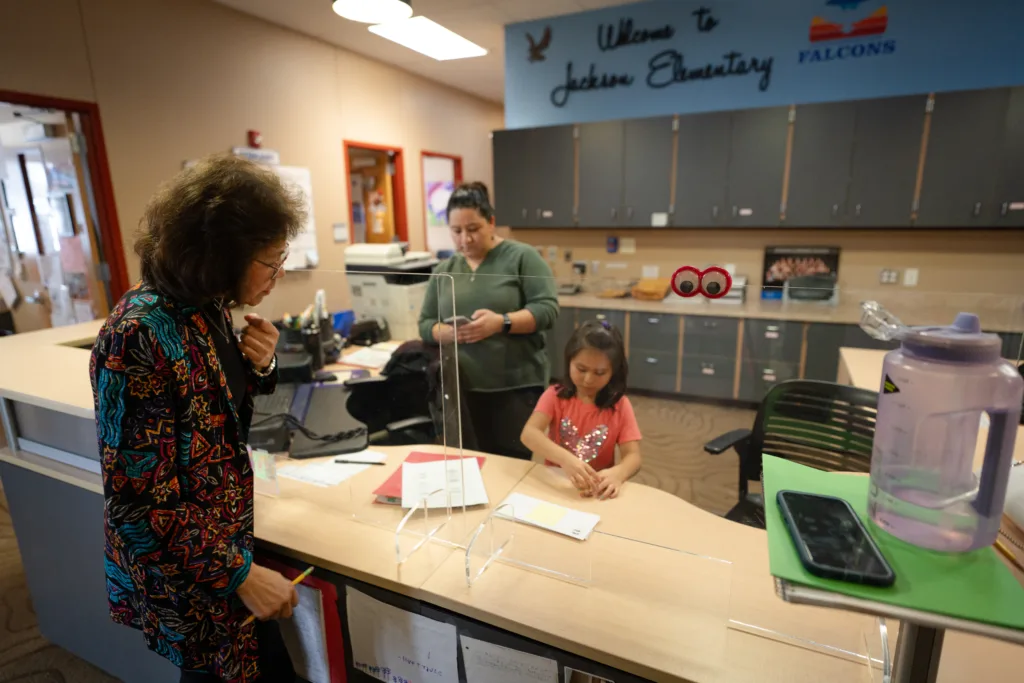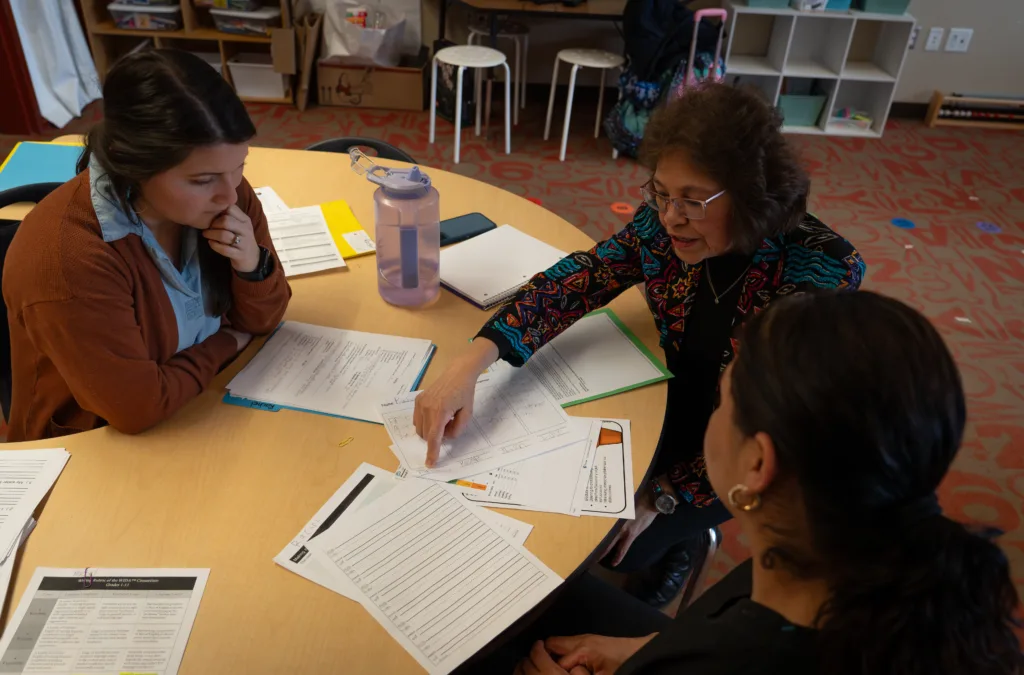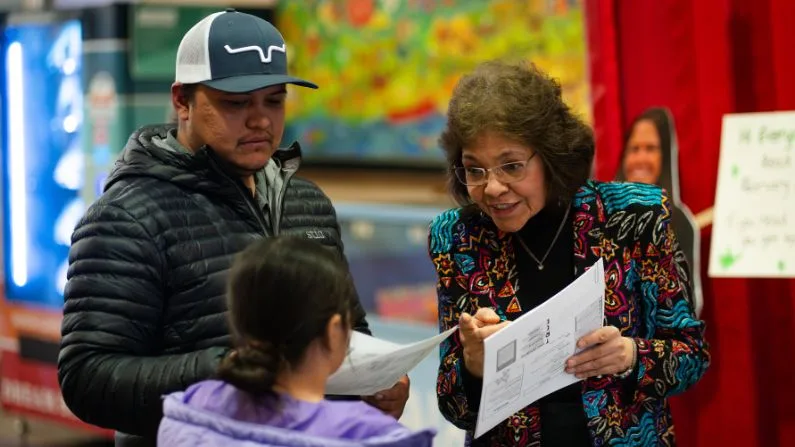Workers in Jackson Hole face unique challenges to power the community. The beauty, wild nature and outdoor access the region offers are some of the great perks of life here. But servers, educators, nurses, home builders and more often have to deal with the high cost of living, long commutes and, for some, learning new languages for their jobs.
In KHOL’s new Workers series, we get to know more about some of the folks that help our community thrive and what drives them to stay here.
When you walk into Jackson Elementary School, one of the first things you might notice is the handwritten note written in colorful, swooping letters on a whiteboard inside the entrance saying “Bienvenidos familias.”
You might then notice that office signs are written in both English and Spanish, and you might hear a snippet of a warm exchange incorporating words and phrases from both languages echoing from down the hall.
At the forefront of this effort to integrate Spanish speakers into the elementary school community is Silvia Davila.
“I love to interpret,” Davila said. “I know what it’s like when you’re a newcomer and don’t know what to ask or what you’re looking for, and you feel lost. So, that’s where I come in.”
Davila is one of a few interpreters at the school, whose job is to provide Latino families with the linguistic services needed to fully participate in Jackson’s public school system. Davila said she and other interpreters work around the clock to ensure that Latino students and families have equal access to the school’s resources.
“I think the Latino community right now is growing a lot. I’m glad to have a lot of new interpreters here because I think it’s vital work that we are doing right now,” Davila said.
There is a good reason for the school’s investment in a team of Spanish translators. Recent estimates put Teton County’s Latino demographic at roughly 30% of its total population, not including those who commute from neighboring areas to work. Latinos make up an outsized percentage of the workforce in key industries such as hospitality, food service and construction.
“I love talking to the parents. You find out many things you can do for them. And the connection is special,” Davila said.

Silvia Davila connects with Latino families at Jackson Elementary School’s parent-teacher conferences in late February. (Kieran Hadley/KHOL)
Finding a home in Jackson
Sitting in her office, which is adorned with photos of her children and a large, detailed map of Mexico, Davila said she grew up in Mexico City, where she studied to become a translator at the Insituto de Interpretes y Traductores.
Faced with economic hardships and the task of raising her two children, Davila decided to move to Jackson in 1998, following in the footsteps of her sister, Carmina Oaks, who had made the move several years earlier. Oaks is also an important member of the Latino community, as the founder of Jackson’s Latino Resource Center.
In 2004, Davila began working as a translator at the elementary school, a job that she said fit her professional experience and personal passion for community service perfectly.
“Being here has been a dream come true,” Davila said. “I love to be with the kids. I love to interpret. I love mingling with the families and trying to help them because they don’t have all of the answers and don’t know what to ask.”
In the beginning, Davila lived with her sister but soon decided to try to find her own housing. What followed for Davila was several years of moving from apartment to apartment as Jackson’s housing crisis became increasingly severe in the early 2000s. Finally, Davila was able to acquire a rent-restricted affordable housing unit in Jackson, which has been her home for the past 15 years.
But Davila dreams of one day being able to afford a home of her own.
I love the apartment I live in. But I have a dream. I want to own my own house. Unfortunately, I have been applying for several [homes] to see if I can buy something but I haven’t had any luck. It is extremely expensive. I see the prices and there’s no way I can afford to pay that amount. – Silvia Davila
A day at work
Davila’s job at the elementary school is fast-paced and multifaceted.
Her workday begins at 8:30 a.m. when she supervises students as they eat their breakfast in the cafeteria. After that, she works in her office, translating letters from teachers to Spanish-speaking families.
But translating these letters is just a fraction of her work, and she is frequently pulled away to aid students, families and teachers with real-time translation.
“There are many phone calls where parents need something or teachers need me to call parents because a kid needs this or that, or the nurse needs me to call, or the psychologist needs me to call for an appointment,” Davila said. “I interact with almost everybody.”
Davila is also involved with three different after-school clubs for Latino students, including a Pokemon Club for fifth graders and a cooking club. This makes for long days, which, though exhausting, allow Davila to do what she loves and make a greater impact on the community.

Silvia Davila checks what parent-teacher conference is on the agenda next. She says keeping track of her many responsibilities at Jackson Elementary School requires intensive organization. (Kieran Hadley/KHOL)
“I get involved in too many things,” Davila said. “Sometimes I get home and it’s just like I’m done. I don’t want to answer the phone, I don’t want to look at the computer. But I love what I do. I love the kids.”
If she could do even more, Davila said, she would.
“In one of the interpreter meetings I was in last week, they asked, ‘If you could be a hero, which hero would you be?’ And I said I would love to be Flash because I could do so many things,” Davila said. “But unfortunately, the day only has eight hours, and I could use ten a day to work.”
Supporting the Latino community
Davila’s dedication to her work and community also stems from her awareness of the Latino community’s need for support.
Because of the high cost of living in Teton County, many Latino people work multiple jobs to make ends meet. This can make it difficult to be fully engaged in their children’s educational experience creating challenges for things like learning English, according to Davila.
“The Latino community here in Jackson is striving to get a good education for their kids,” Davila said. “They struggle with housing, of course. The rents are just so high, they have to work probably two, or three jobs … they have to work so much, sometimes they just don’t have enough time to take a little bit more time with their kids. But they do their best.”
Davila said that translators and interpreters are among the Latino community’s most important resources. In a recent meeting with Latino parents, Davila said they emphasized how having a translator allows them to take a greater part in their children’s education, as they sometimes feel uncomfortable in settings in which they are unable to fully express themselves in English.
“We need more interpreters. We need more people to be bilingual, to be able to help,” she said.

Silvia Davila translates for first-grade teacher Andrea Largey during the February parent-teacher conferences. Translating for teachers in these conferences is just one of many aspects of Davila’s job as a translator at Jackson Elementary School. (Kieran Hadley/KHOL)
But according to Davila, being a translator or interpreter isn’t as simple as being able to speak two languages.
“Interpreting takes a long, long time. It’s a process. Many people think that being bilingual is good enough … it’s not good enough,” she said, adding that the best way to train interpreters is at specialized schools like the one she attended in Mexico City.
Davila is more than simply a resource for the community — she is also a vibrant member of it. As she walked through the halls of the elementary school, she was stopped by friends, colleagues and parents, with whom she chatted warmly in Spanish, English and sometimes a mix of the two. No matter the language though, these encounters invariably ended with a “thank you” or “gracias” for Davila and her service.
For Davila, this is also part of the reason she said she loves what she does.
“The JES [Jackson Elementary School] community is my second home. Everybody here puts so much effort into the kids,” said Davila. “I’m proud to be a part of the elementary school community.”





